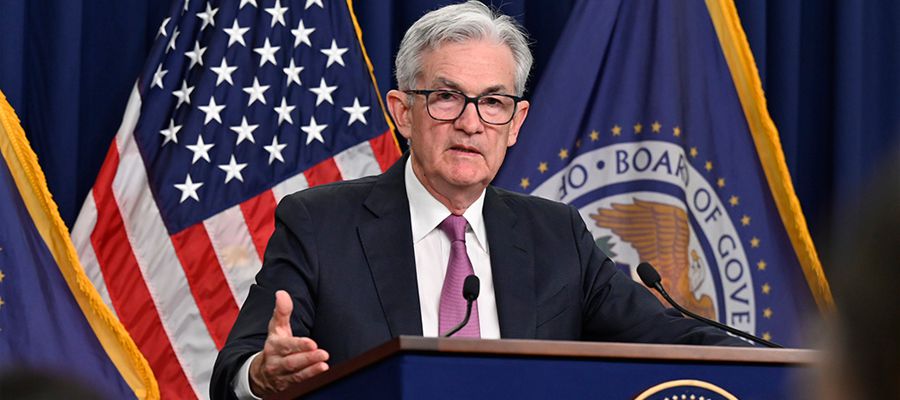The Fed remains focussed on addressing elevated inflation through monetary tightening.
- Friday, November 4, 2022
 On Tuesday 2nd November, the Fed FOMC raised interest rate by 0.75%s to 4.0%, which was broadly in line with what the economic consensus had expected. This is the fourth consecutive time that the FOMC has raised interest by an aggressive 0.75%.
On Tuesday 2nd November, the Fed FOMC raised interest rate by 0.75%s to 4.0%, which was broadly in line with what the economic consensus had expected. This is the fourth consecutive time that the FOMC has raised interest by an aggressive 0.75%.
Fed Chair Powell sounded hawkish saying that he preferred “to overtighten” and then “use our tools to support the economy later on.” Powell expressed that “if we failed to tighten enough, inflation would become entrenched and that would be a much bigger problem’. In other words, the Fed continues to remain focussed on addressing elevated inflation through monetary tightening.
In the near-term, the Fed remains hawkish. Nevertheless, given that the FOMC has raised rates at a rapid pace in a short period of time, there is potentially room for a future step-down in tightening. The Fed Futures market is now looking for the FOMC to raise interest rates by 0.5% at its December meeting, before stabilising at around 5% in 2023.
The risk for the Fed is that inflation surprises on the upside. This could come via a tight labour market that drives up costs and pushes wage inflation. However, the latest Employment Cost Index for the third quarter was reported in line with economists’ expectations and stabilised at 5.0%, the same rate as the previous quarter. Importantly, this was the first time since the pandemic that the annual rate of wage inflation growth stopped accelerating and suggests that higher wages may not be getting entrenched in the labour market.
Another concern for the Fed is that inflation upside could come from higher energy prices. The latest developments from Organization of the Petroleum Exporting Countries, OPEC+ (which includes Russia) to reduce oil output by 2mbd in October is not encouraging. What makes this a highly unusual decision is that the West had called on the Middle East-led oil cartel, and particularly the Saudis, to keep crude oil flowing during this energy shortage.
The official reason given for the OPEC+ production cut is that it is a response to rising interest rates and declining global growth expectations in advanced economies. Nevertheless, it is possible that OPEC+ egged on by Russia, is pushing back against the desire of the West to lower energy prices. After all, OPEC+ is a profit maximising oil cartel with material pricing power. In short, energy is increasingly becoming weaponised. The result is that crude oil prices have started to trend up again with Brent Crude Oil at US$95pb which complicates the job of the FOMC to stamp down hard on inflation.
As it stands, money markets forecast US short-term interest rates to peak at around 5.0% next year. Should interest rate expectations stabilise it should provide an opportunity for equities to recover from deeply oversold levels and low valuations.
On Wednesday 3rd November, the day after the Fed announced a 0.75% rate rise so the Bank of England raised UK rates by the same 0.75%. The Bank lifted the UK interest rate to 3% from 2.25%, the biggest increase since 1989. This takes borrowing costs to their highest since 2008, when the UK banking system faced collapse.
This rise in UK interest rates to 3% was expected and was voted on a 7-2 majority. Two members of the MPC voted for a 0.5% rise. This worried markets as it indicates that policy makers are concerned about the economy and recessionary pressures enough to prioritise a lower rate above inflation control. The BoE has warned the UK will see its longest recession since records began and will face a “very challenging” two-year slump. It also warned the unemployment rate will nearly double. The Bank believes by raising rates it will make it more expensive to borrow and encourage people not to spend money so easing pressure on prices.
Markets were expecting the rate rises of 0.75% from both the Fed and BoE, the hawkish comments from Jerome Powell that the Fed remains focussed on addressing elevated inflation through monetary tightening and that in the UK two BoE MCP members were pivoting on interest rate rises has resulted in some stock market falls.

Chris Davies
Chartered Financial AdviserChris is a Chartered Independent Financial Adviser and leads the investment team.
About Estate Capital
Financial Services
Our Contacts
7 Uplands Crescent,
Swansea, South Wales,
SA2 0PA.
Tel: 01792 477763
